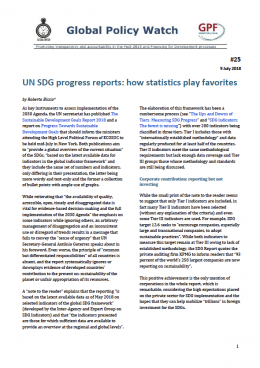By Roberto Bissio
As key instruments to assess implementation of the 2030 Agenda, the UN secretariat has published The Sustainable Development Goals Report 2018 and a report on Progress Towards Sustainable Development Goals that should inform the ministers attending the High Level Political Forum of ECOSOC to be held mid-July in New York. Both publications aim to “provide a global overview of the current situation” of the SDGs, “based on the latest available data for indicators in the global indicator framework” and they include the same set of numbers and indicators, only differing in their presentation, the latter being more wordy and text-only and the former a collection of bullet points with ample use of graphs.
While reiterating that “the availability of quality, accessible, open, timely and disaggregated data is vital for evidence-based decision-making and the full implementation of the 2030 Agenda” the emphasis on some indicators while ignoring others, an arbitrary management of disaggregation and an inconsistent use or disregard of trends results in a message that fails to convey the “sense of urgency” that UN Secretary-General António Guterres speaks about in his foreword. Even worse, the principle of “common but differentiated responsibilities” of all countries is absent, and the report systematically ignores or downplays evidence of developed countries’ contribution to the present un-sustainability of the planet or unfair appropriation of its resources.

